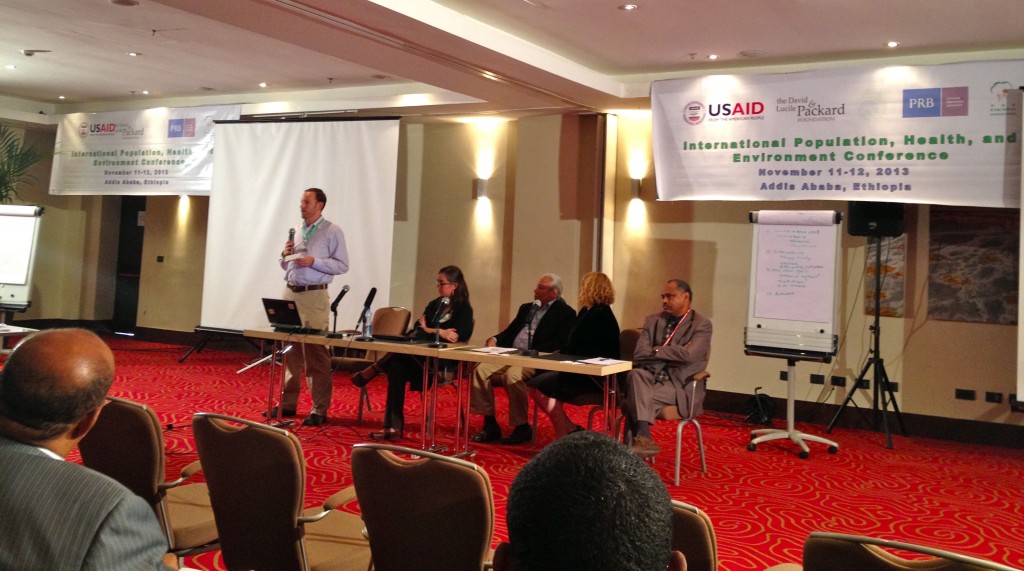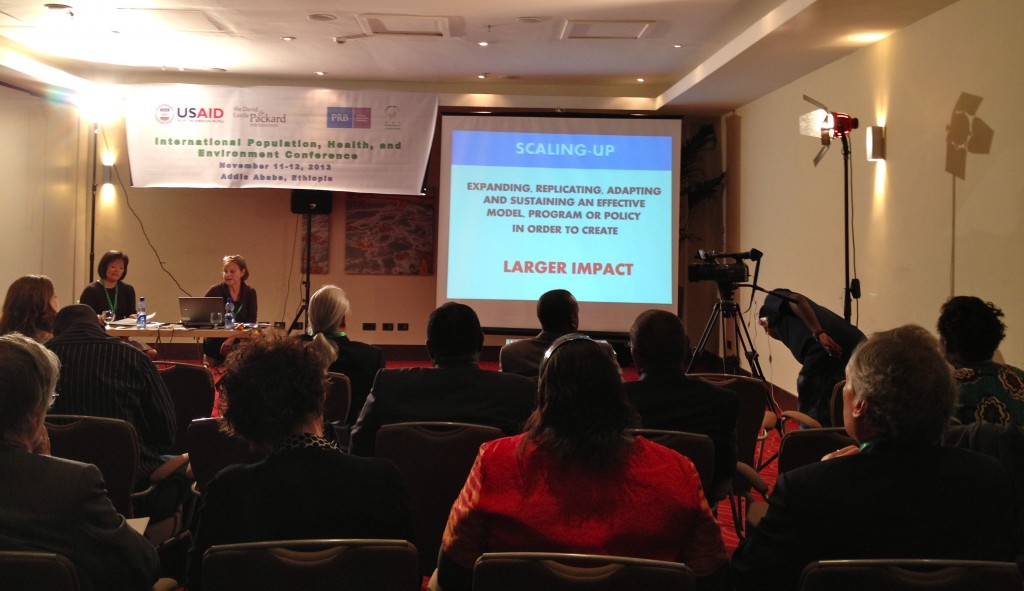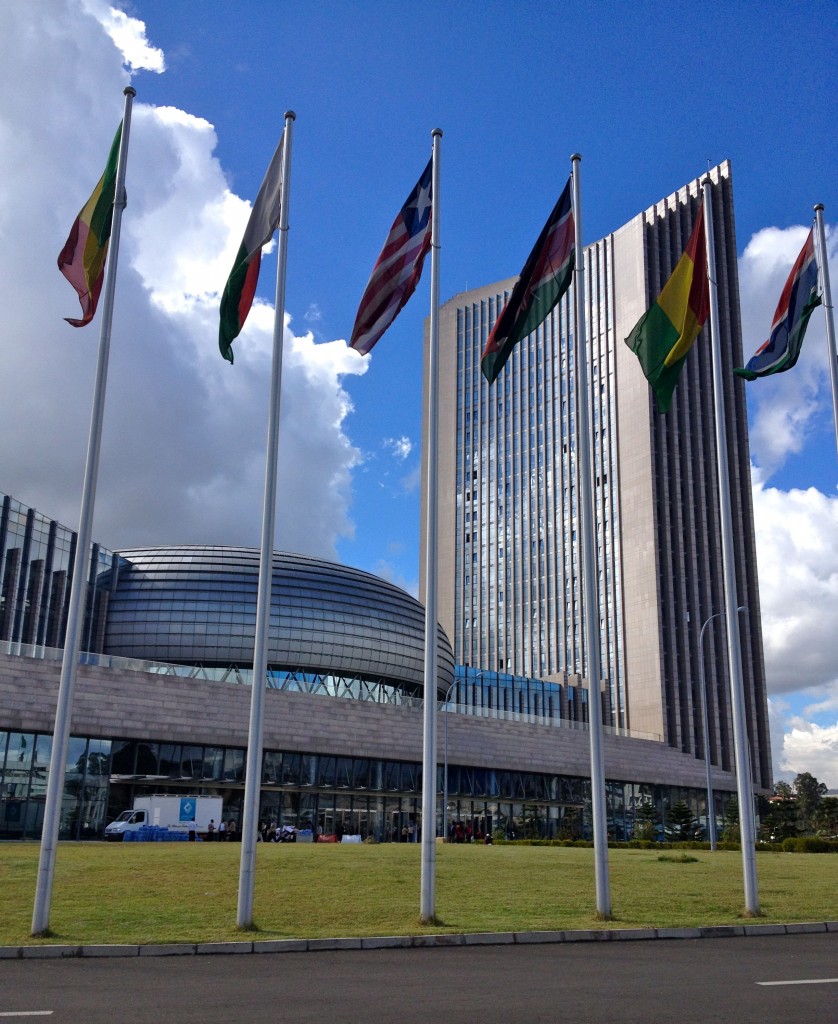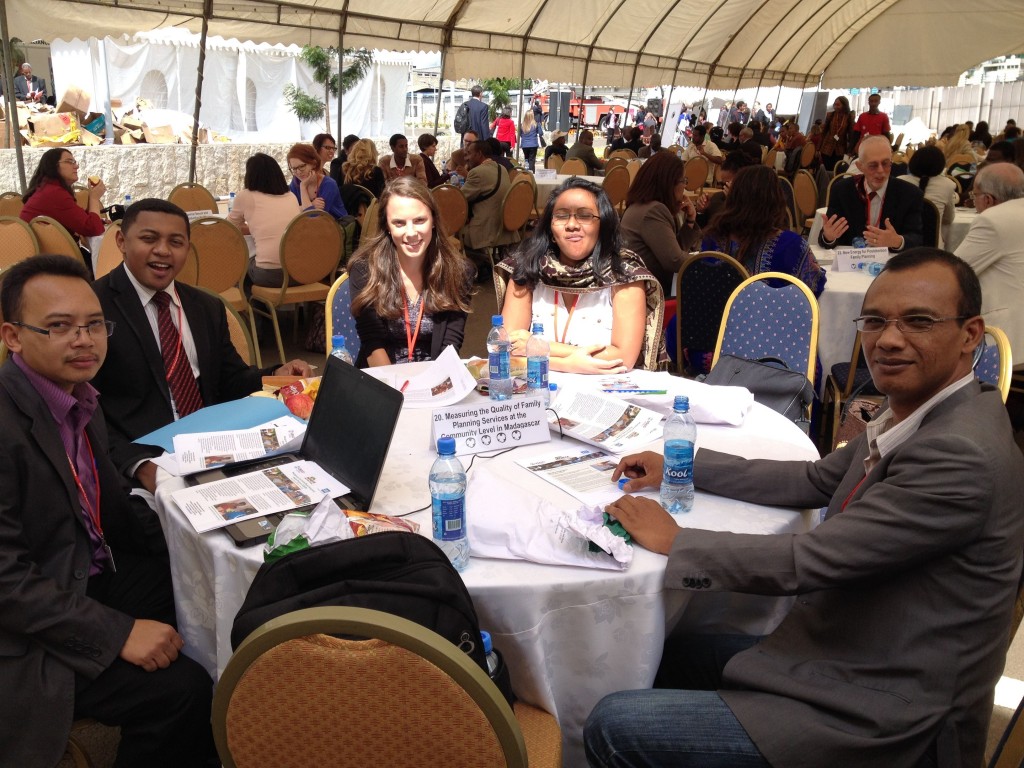By Laura Robson and Caroline Savitzky
The excitement was palpable as we gathered with almost 200 of the world’s finest Population-Health-Environment (PHE) practitioners, researchers and advocates in Addis Ababa for the International PHE Conference earlier this month! With all of us working on integrated projects encompassing family planning, community health, sustainable livelihoods and environmental initiatives, there were many ideas and progress updates to be shared.
Buoyed with enthusiasm from our field visit to one of the PHE Ethiopia Consortium’s projects the day before, we joined colleagues from countries including the US, Philippines, Uganda, Kenya and Madagascar for an action-packed two days of exchanges, starting with a range of panel presentations followed by various themed breakout discussions, which were then summarised during the closing plenary.

Matt Erdman, Blue Ventures’ former Safidy Programme Coordinator now working in Washington DC, summarised discussions from the ‘scaling up’ group at the closing plenary of the International PHE Conference. Left to right next to him: Kristen Stelljes (Hewlett Foundation / ‘monitoring & evaluation’), Ricky Hernandez (PATH Foundation / ‘best practices for implementation’), Meaghan Parker (Wilson Center / ‘communications’), Negash Teklu (PHE Ethiopia Consortium / ‘advocacy’)
Having shared Blue Ventures’ results from six years of integrating family planning services with marine conservation and coastal livelihood initiatives in southwest Madagascar, and our ideas about methods for evaluating the value-added benefits of PHE, we moved into the working group sessions, which provided an excellent opportunity to exchange learning with other organisations and individuals.
Cross-sector partnerships for scaling up PHE
Inspired by the PATH Foundation’s excellent presentation about their experience of scaling up PHE in the Philippines to reach more than 1 million people across the Danajon Bank ecosystem, we participated in a working group that explored the challenges of expanding, replicating, adjusting and sustaining PHE across large areas.

Leona D’Agnes of the PATH Foundation presenting their experience of scaling up PHE in the Philippines as part of a panel on innovative partnerships at the International PHE Conference, moderated by Sono Aibe of Pathfinder International
Collaborations between conservation and health organisations have been key to the PATH Foundation’s success in the Philippines, and are underpinning Pathfinder International’s wide-reaching project in the Lake Victoria Basin, so cross-sector partnerships were identified as an effective way of driving broader adoption of PHE. This resonated with our most recent experiences in Madagascar, as we’re supporting other environmental organisations, such as the Duke Lemur Center’s Sava Conservation initiative, to explore ways of working with our excellent health partners and offering family planning services in their conservation zones.
Process evaluations to capture the synergies generated by PHE
Monitoring and evaluation was another hot topic of conversation at the conference, with discussions moving away from sector-specific outcome indicators towards more qualitative approaches, as we tackled the big question of how to capture the synergies and value-added benefits generated by PHE.
Conducting process evaluations (collecting and analysing data to build up and refine theories about how PHE works) and collaborating with research institutions were two key recommendations from this group, which included professors and students from the Johns Hopkins Bloomberg School of Public Health, and we were able to contribute some unique insights thanks to our consultations with academics in the UK.
Communicating the complexity and richness of PHE
We were fortunate to be joined by eminent journalists Sam Eaton and Ken Weiss at the conference, who are at the forefront of PHE reporting in the US media, with a breakout discussion focusing on communications and advocacy.
Drawing on the Population Reference Bureau’s new ENGAGE presentation and the Wilson Center’s compelling Healthy People Healthy Environment film, this group identified key challenges that we as a community face in communicating the complexity of PHE, particularly in terms of the Malthusian assumptions that some people are still prone to draw about our programmes when we talk about the connections between population, health and the environment. It was clear that some work remains to be done in dispelling common myths, and explaining the rights-based and community-driven nature of PHE.
PHE is alive… kicking… and screaming!
All in all, the International PHE Conference was a wonderful opportunity for us to connect with some truly phenomenal organisations and individuals, participate in lively discussions around topics of direct relevance to our health and conservation programmes, and generate lots of fresh thinking to take back to our team.
Roger-Mark De Souza, a great friend of Blue Ventures and director of the Environmental Change and Security Program at the Wilson Center, closed the meeting with a reflective and rousing address, encapsulating perfectly where we are as a PHE community:
PHE is alive…
We have a pulse
We are comfortable in our skin
We are embracing our complexity
We are making new friends
PHE is kicking…
We have a range of results
We are confident in our approach
We are exploring ways to get to the heart of our innovation
PHE is screaming…
We are dynamic
We are hungry to learn
And so we all took this PHE “high” through to the International Conference on Family Planning (ICFP) also being held in Addis Ababa that week; the largest gathering of the international family planning community to date. We joined some 3,000 delegates from more than 100 countries in the hugely impressive African Union conference centre, with 15 sessions over the three days focused on PHE.

African Union conference centre
In between presenting the results of our integrated work in southwest Madagascar, and facilitating a roundtable discussion exploring the potential of partnerships between conservation and health organisations for reaching the hardest to reach with family planning services, we had the chance to attend many informative panels and workshops.
Highlights included presentations about the determinants of contraceptive use and the influence of social networks on health behaviour, and a session on evaluating community health worker programmes, with a particularly fascinating study presented by USAID Madagascar, which demonstrated the value of refresher training for bettering the performance of community health workers.
Our partners Marie Stopes Madagascar and MAHEFA were also at the ICFP, and we joined them for an interesting roundtable discussion about participatory approaches for measuring the quality of family planning services at the community level in Madagascar.

Left to right at the Madagascar community health worker roundtable: Andry Rabemanantsoa and Tony Homsi of MAHEFA, Laura Robson of Blue Ventures, Lalaina Razafinirinasoa and Julien Raharison of Marie Stopes Madagascar
High-level recognition from the international family planning community
As the conference drew to an end after a busy week of networking, sharing and learning, Caroline had the extraordinary honour of accepting an Excellence in Leadership for Family Planning (EXCELL) award for Blue Ventures’ integrated PHE work! These inaugural awards recognise major breakthroughs in the areas of family planning demand generation, service provision, research and advocacy, and we were very excited to be one of just two organisations to receive one.
After numerous emotional run-throughs with Laura in the lead-up to the closing ceremony, Caroline did Blue Ventures proud by delivering a truly heartfelt and impactful acceptance speech, calling upon the international family planning community to explore all options for ensuring full access to reproductive health services for the world’s most isolated communities, including working in an integrated way and partnering with conservation organisations.

Caroline received the EXCELL award from Professor Amy Tsui, Director of the Bill & Melinda Gates Institute for Population and Reproductive Health, and His Excellency Dr. Kesete-Birhan Admasu, Minister of Health of the Federal Democratic Republic of Ethiopia (photo credit: David Colwell)
Not only did we receive this award on behalf of the entire Blue Ventures team, including our visionary medical director Dr Vik Mohan, our long-standing health partners, and most of all our tremendously dedicated community health workers, but we also really felt that this was an enormous endorsement of the pioneering work of the entire PHE community. We were delighted to be able to share this moment with many of our PHE friends at the ICFP, as a wonderful end to an inspiring week!

Blue Ventures’ Excellence in Leadership for Family Planning award (photo credit: David Colwell)
After a few days exploring the beautiful Tigrai region in northern Ethiopia, we returned to the UK and Madagascar more dedicated to and invigorated about our work than ever. As Roger-Mark so powerfully proclaimed, “PHE is alive, kicking and screaming!”
Laura and Caroline’s attendance at these conferences was supported by the Population Reference Bureau and UNFPA Madagascar. Blue Ventures’ community health programme is supported by the MacArthur Foundation, and benefits from partnerships with Marie Stopes Madagascar, Population Services International and MAHEFA.

